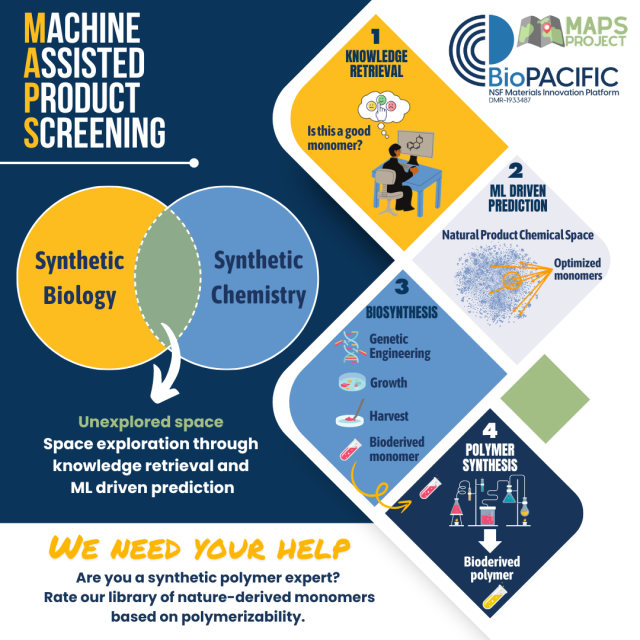MAPS: Machine Assisted Product Screening Project
Join MAPS in shaping sustainable polymer research – your expertise matters!

The machine assisted product screening (MAPS) project is dedicated to leveraging the collective biological and chemical knowledge to bridge the gap between synthetic biology and synthetic chemistry. Its primary aim is to explore bio-derived monomers for creating sustainable polymers with customizable properties. With the pressing need to combat pollution caused by petroleum-based plastics, MAPS will provide a vital platform for researchers to discover and develop promising alternatives.
A few pre-existing machine learning (ML) tools have excelled in predicting chemical reactions based on their reactivities. However, when it comes to polymerization reactions involving radicals and other complex processes, these conventional tools often fall short, predicting unrealistic outcomes. This limitation arises from the lack of training data specific to polymer synthesis.
To address this challenge, MAPS is on a mission to compile a comprehensive database of polymerizability tailored to natural product molecules. Establishing the MAPS database is a big challenge due to the absence of a pre-existing database in this domain. To address this obstacle, we are actively seeking synthetic expertise from experts to develop a targeted ML algorithm for predicting polymerizability. But we can't do it alone.
Here's how you can contribute to sustainable polymer innovation:
- Log into the BioPACIFIC MIP portal and visit the MAPS 2.0 web application developed by BioPACIFIC MIP and provide ratings for both molecules and functional groups involved in potential polymerization pathways.
- Your insights will help identify "good" molecules – those that are readily bio-synthesizable and polymerizable – and highlight the path towards sustainable polymer solutions.
- Each molecule's rating, ranging from 1 (indicating a "bad" monomer) to 5 (reflecting a "good" monomer), will fuel the development of the MAPS ML algorithm, and guide us in pinpointing polymerizable monomers from the vast landscape of bio-derived compounds.
By actively participating in the MAPS project, you're not just contributing data – you're driving sustainable materials innovation in polymer research. Join us in shaping a sustainable future and innovating bio-friendly materials for polymer community!
Log into the BioPACIFIC MIP portal (link to MAPS), and join us in evaluating bio-derived molecules!